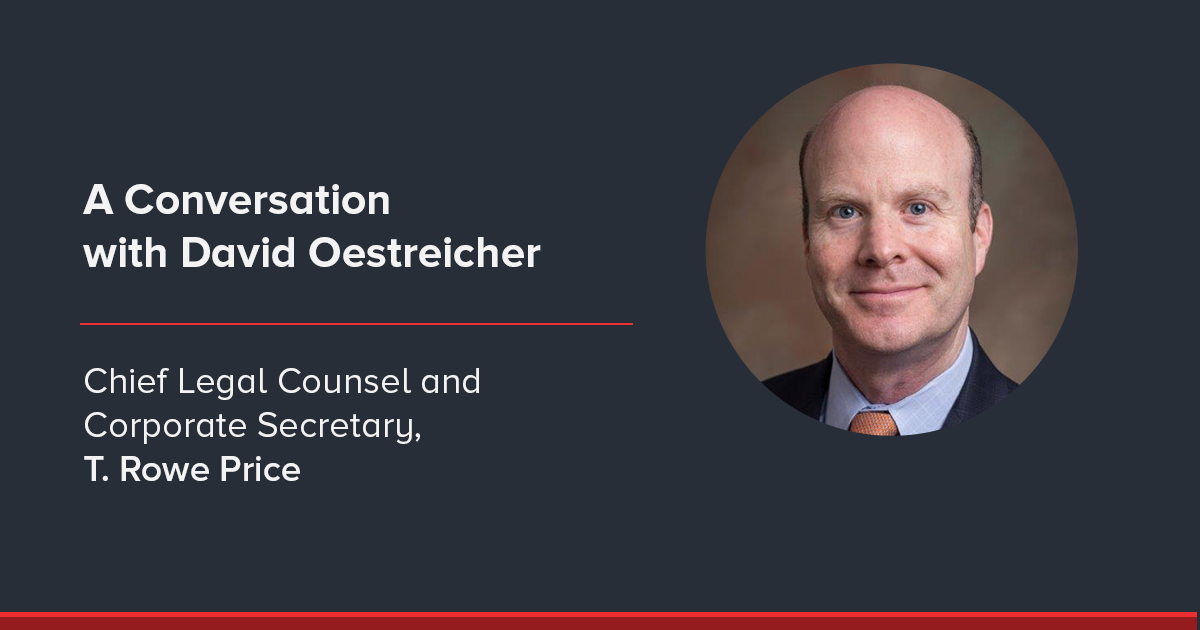In this Q&A, Merryck & Co.'s David Reimer and Adam Bryant interview David Oestreicher, Chief Legal Counsel and Corporate Secretary, T. Rowe Price. As his growing legal team nears 300 people, Oestreicher touches on the importance of leadership and the lessons they don't teach in law school.
David Reimer is the CEO of Merryck & Co Americas. Adam Bryant is a Managing Director at Merryck & Co and long-time Columnist of The New York Times' "Corner Office."
___________________
Bryant: How did you get into law in the first place? Is it something you've wanted to do from the time you were very young?
Oestreicher: When I was a boy, I initially wanted to be an archaeologist, and then I thought I wanted to be a U.S. Senator. That changed to wanting to be a businessman, and from there I shifted over time to wanting to be a lawyer. But I didn't want to be a litigator. I was still drawn to business and wanted to practice some kind of business law. And in a way, you can argue that I've worn all those hats in some way.
In terms of archaeology, much of the law is about precedent — learning from the past. I have absolutely no aspirations to get into politics, but we work very closely with government, including helping our regulators and legislators understand the impact of their decisions on our industry. And the role of in-house counsel is not to act as a law firm inside a company. Rather, we are more closely akin to our business partners, but with legal expertise and a legal lens. So, as I said, in a way, I've satisfied all of those childhood aspirations.
Bryant: What were the subtle aspects of the GC role that you didn't quite appreciate until you were in the role?
Oestreicher: Without generalizing too much, often the best lawyers love the thrill of solving a problem or being the "go to" subject matter expert for their clients. When you're no longer responsible for a practice area or a particular set of clients — and instead your role broadens and is less connected to the day-to-day — then you have to understand other ways to make an impact and give you satisfaction in the new role.
And that means focusing more on leadership. Lawyers often are no-nonsense people. The softer skills and other aspects of leadership are not necessarily their strong suit. Oftentimes lawyers don't appreciate what management and leadership really is, because in a way, law schools are focused on the technical skill sets that make for great advocates and individual contributors. But there really is a science to leadership and bringing the best out of people. Being a technical expert is table stakes at the start. In a way, it becomes less relevant over time, especially as you're broadening your scope, developing your team and empowering them to do their jobs.
Reimer: How has the role of the general counsel evolved?
Oestreicher: Because of the legacy of how our company grew up and the fact that we've had such a significant regulatory overlay to our business, the focus of our legal department for years was on the regulatory side. But it's evolved to have more engagement with other stakeholders more aligned with traditional aspects of a GC's role ' as thought partner to our CEO, head of HR, the CFO, and our board.
I've been lucky enough to be involved in a lot of our strategic cross-functional committees, such as our Management Committee, which the legal department historically had not been a part of.
I also would say that an in-house legal department is a business in and of itself, but not in the traditional law firm sense. That's not the value you're there to provide. We run our department like a "solutions business." The value that you're providing as in-house counsel is much more than just the law.
It's about understanding the business, understanding your client's goals, being able to talk at their level, understanding the industry landscape and not just the legal landscape. You're not getting discrete research projects on technical legal questions. You're part of a strategy from conception to delivery and beyond. That's one of the most exciting parts about being in-house counsel.
My predecessor was known for always reminding the department, "Don't talk like a lawyer to non-lawyers." They don't relish the legal concepts and technical intricacies. Lawyers may love to talk about that, but your clients don't. It's all about the focus on the business solution you can bring to them. You should protect them from the legal technicalities and give them the actionable advice that comes from all the hard work you've done.
Bryant: Talk about your learning curve as a member of the leadership team.
Oestreicher: I'm an observer, first and foremost. I don't like to hear myself speak unless I feel I can add value. It's about choosing how you want to show up. I can choose to show up as the senior-most lawyer in the organization. But I choose to show up as a senior executive who happens to look at business issues with a legal lens, but that's not the only lens I use.
When you approach your role that way, you give yourself the freedom and the license to speak on any issue in any capacity. If you marry that with good business judgment and are strategic about when you say something and how you say it, you'll be valued and relied on by your peers. You have to leave your title at the door and engage.
Reimer: What role should the general counsel's office play in shaping the culture of an organization?
Oestreicher: It should play an incredibly important role, but it shouldn't play the only role. If an organization is looking to the legal and compliance department to be the keepers of the culture, then that's a problem. Everyone needs to own and live the culture.
Clearly, as lawyers and compliance professionals in a fiduciary business, we're champions of the culture. We're in a unique position to see a lot of activity where culture is tested. We're in meetings and decision-making bodies when culture is on display and can either be reinforced or changed forever. So it's a really important role, but we can't be the only ones to play it. If the frontline associate feels like they can let Legal and Compliance take care of it, you're already losing.
Culture is what you do when no one's looking. But, in a way, because of our role and our access, we're usually there and we're looking. So, just in case, we can make sure culture is top of mind when it really needs to be.
Bryant: How are you thinking about how your role is going to evolve in coming years?
Oestreicher: Leadership is critical, especially when you think about the need to build a sustainable organization that continues to grow and meet the challenges and needs of our clients and business. My leadership style is to be present, accessible and relatable to people. When I started at T. Rowe, our department was 50 people and 10 lawyers and now we're about 275 people overall, with about 80 lawyers in offices around the world. How do I keep that closeness and that connection to my team as we continue to grow?
Diversity and inclusion is also a big focus. We need to do a better job at attracting and growing diverse talent and unlocking the power of that talent. I love to use the word courage, and I use it in two ways. One is that people need to have the courage to speak up and speak truth to power and disagree. I often use the analogy of the scene in the movie Big with Tom Hanks. He's in the boardroom and his nemesis is talking about a toy that's a building that turns into a robot. Everyone goes along, thinking it's a great idea, but then Tom Hanks raises his hand and says, "I don't get it. What's fun about playing with a building?" And then all of a sudden, a real discussion breaks out. The courage of a 13-year-old boy averts a bad decision.
Ask questions, disagree, be respectful but let's get the debate going. So it's the courage to speak up. But the flip side is that even if you have powerful convictions, you have to have the courage to listen. And be open to the idea that you may change your mind. So when you ask for opinions, take them to heart. If you ask somebody for feedback, don't dismiss or ignore it. Be open to it. Let it improve your thought process and factor it into your actions and decision-making.
Related to all of this is the need for a global mindset. While polarizing rhetoric fills the airwaves, we're a global company — clients, associates, shareholders, regulators and other stakeholders around the world. Navigating global complexity will only become more important as we evolve.





